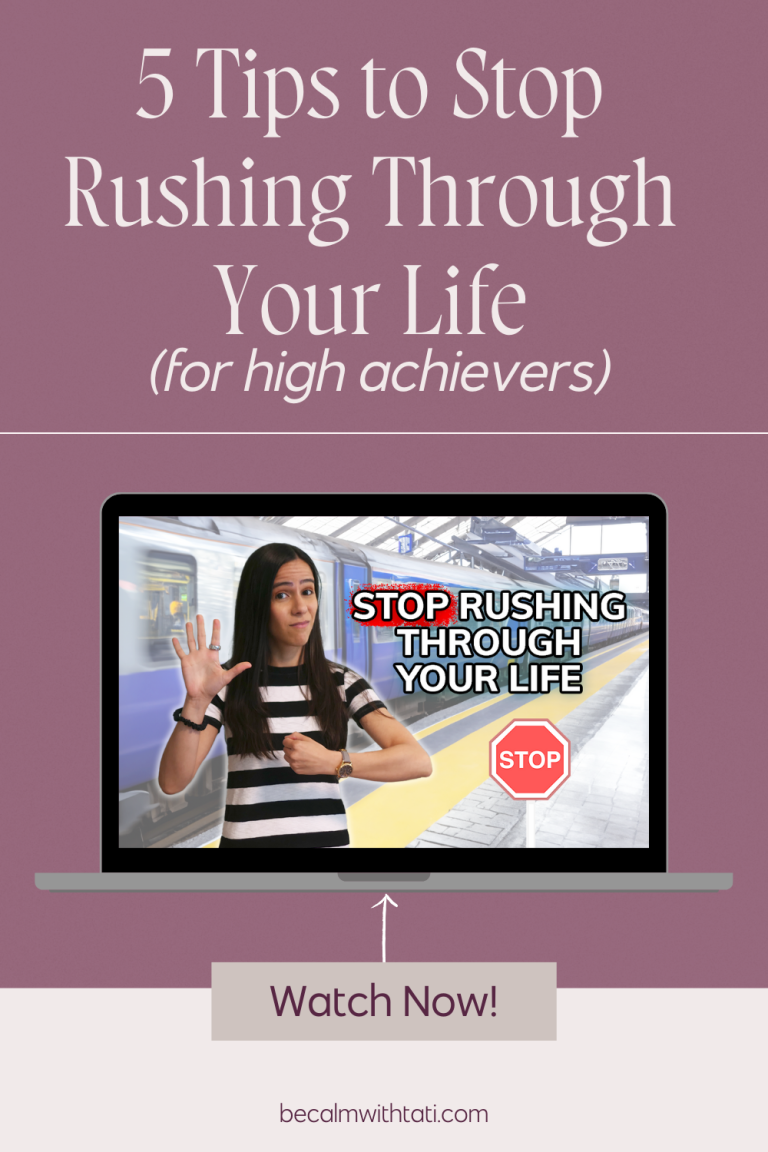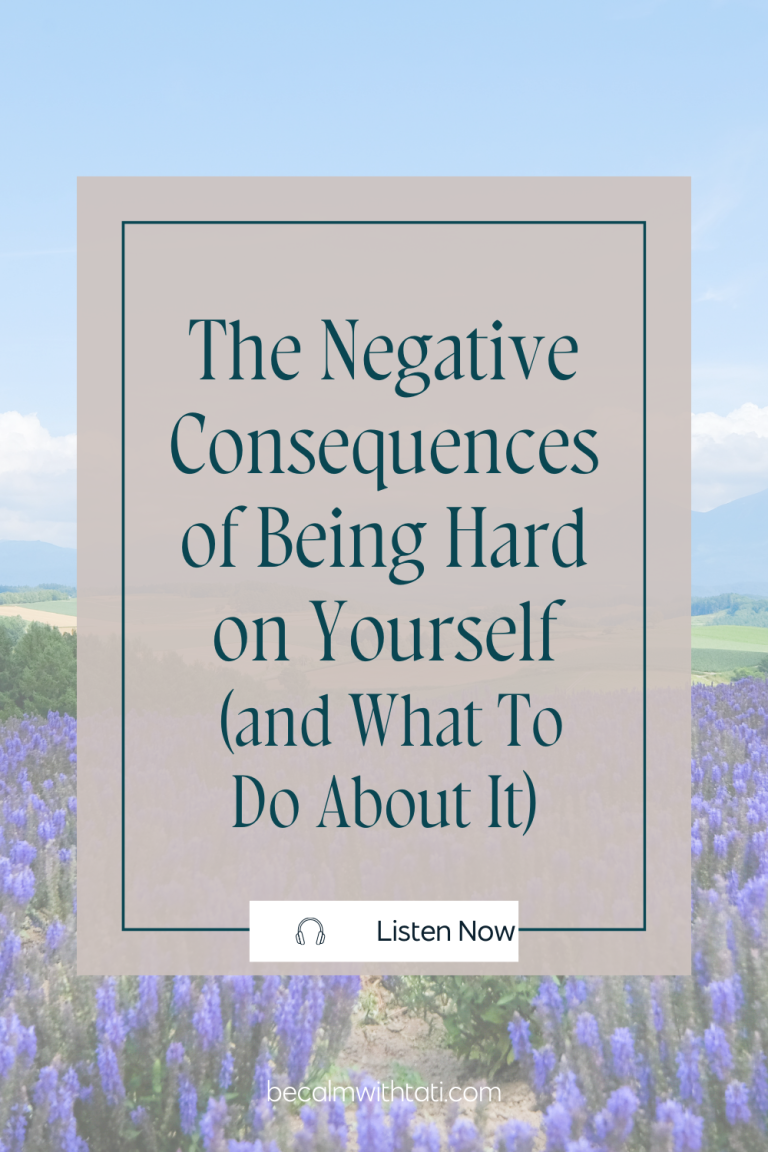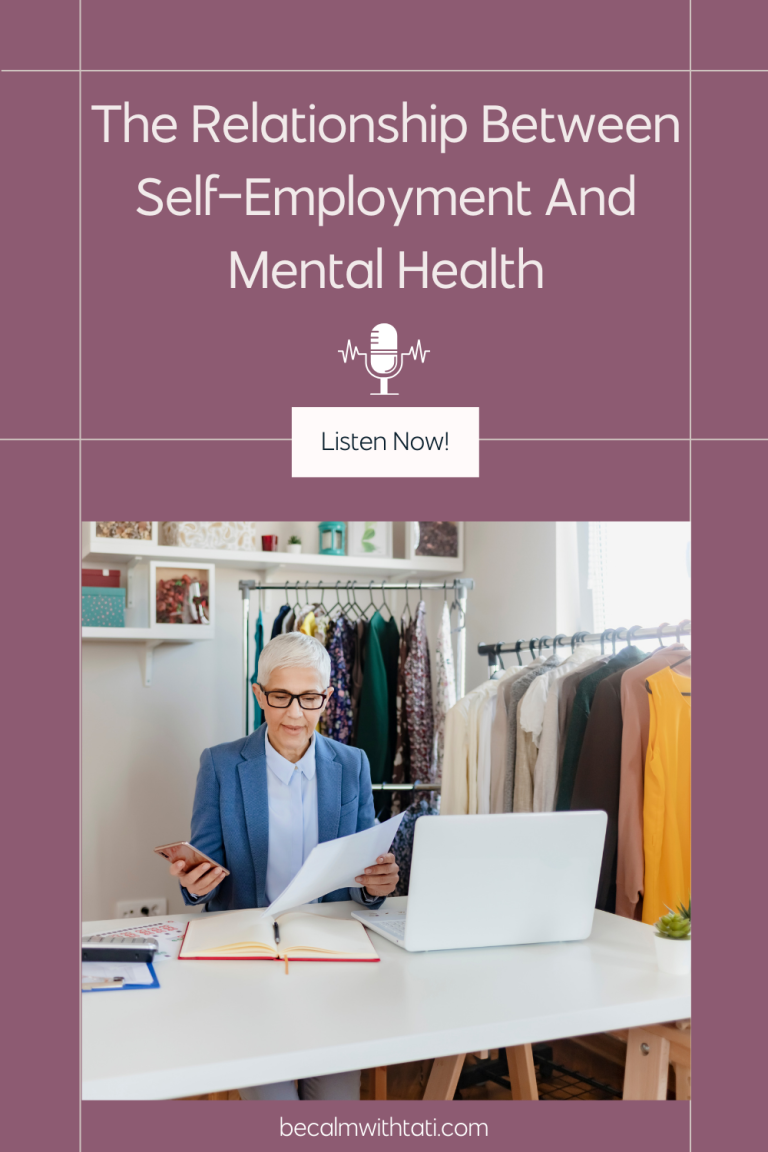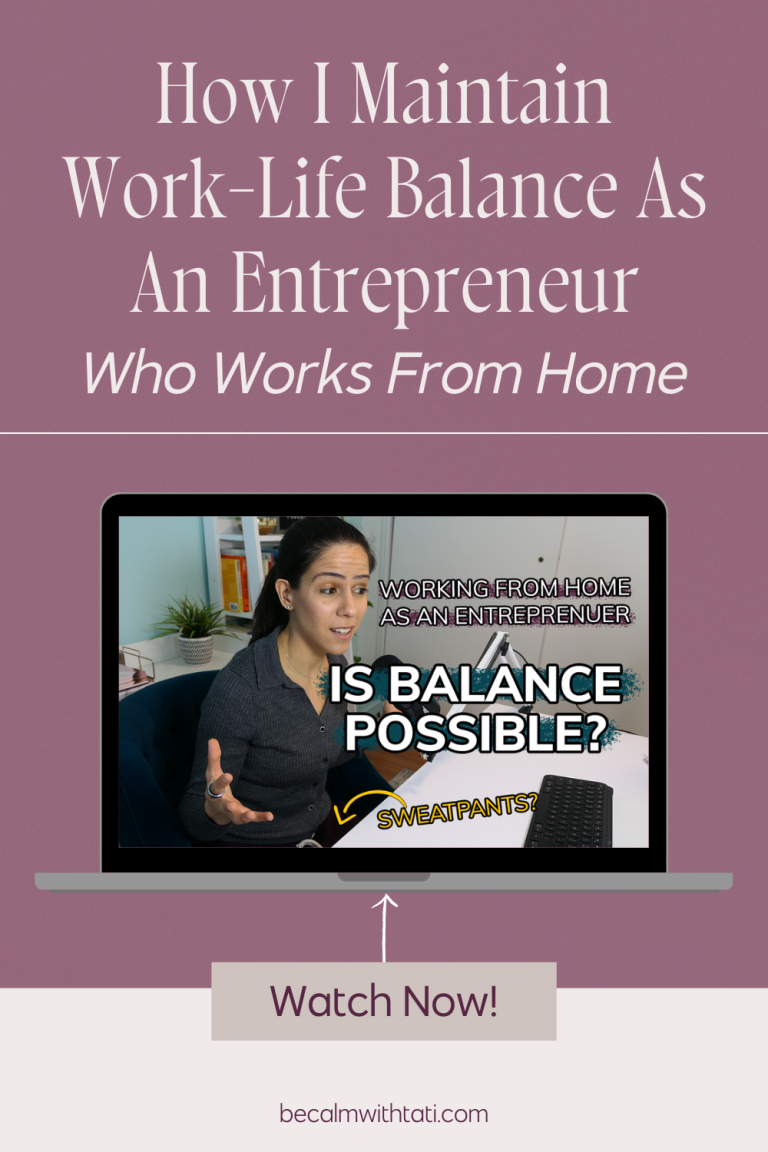Performance anxiety: it’s the psychological and physical nervousness that occurs before and during a performance of any kind that can make it more challenging to focus, do your best, and feel confident in yourself. Performance anxiety affects up to 20% of Americans, including individuals who perform for a living and those who are in positions of leadership. It is entirely possible to take steps to reduce your performance anxiety so you can perform and present yourself with more ease and inner confidence, and that’s what we’ll be discussing in today’s episode.
In this episode, you will learn:
- The triggers, signs, and symptoms of performance anxiety
- The mistakes that are making your anxiety worse
- 5 actionable tips to overcome performance anxiety effectively
Source:
Mentioned in episode:
Stop Overthinking Course: https://becalmwithtati.thrivecart.com/stop-overthinking-everything/
How to Deal With Imposter Syndrome: https://www.becalmwithtati.com/imposter-syndrome/
https://youtu.be/6rIFEWgxScE?si=_-3jaxakSZlFP7AM
LISTEN NOW:
🎧 CLICK HERE TO LISTEN TO CALMLY COPING WHEREVER YOU LISTEN TO PODCASTS
WATCH NOW:
FREE TRAINING: How to Create Work-Life Balance and Feel Calmer From Within
If you want to learn how to take back control of your life so you can feel calmer and more confident, and learn the tools to spend your time according to what matters most to you (no matter what your schedule is like right now)…
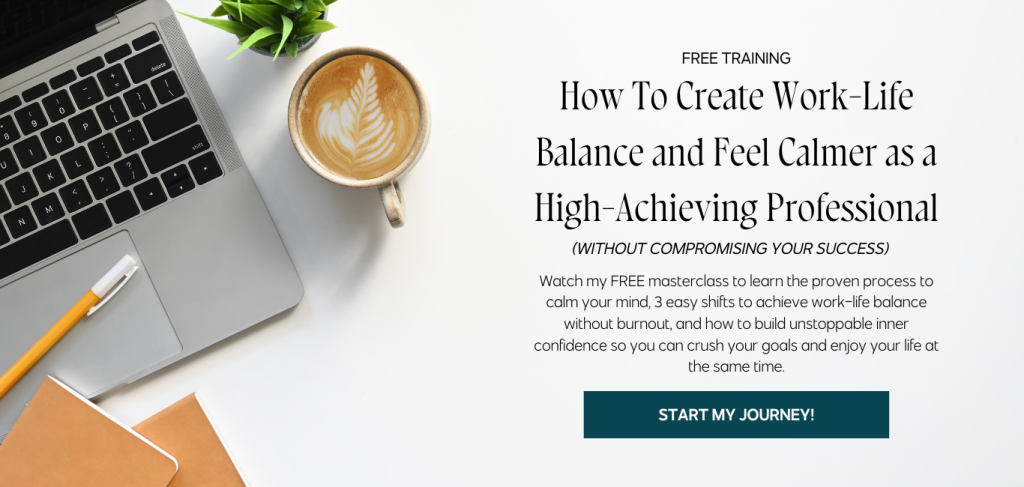
LISTEN, REVIEW, AND SUBSCRIBE TO THE PODCAST!
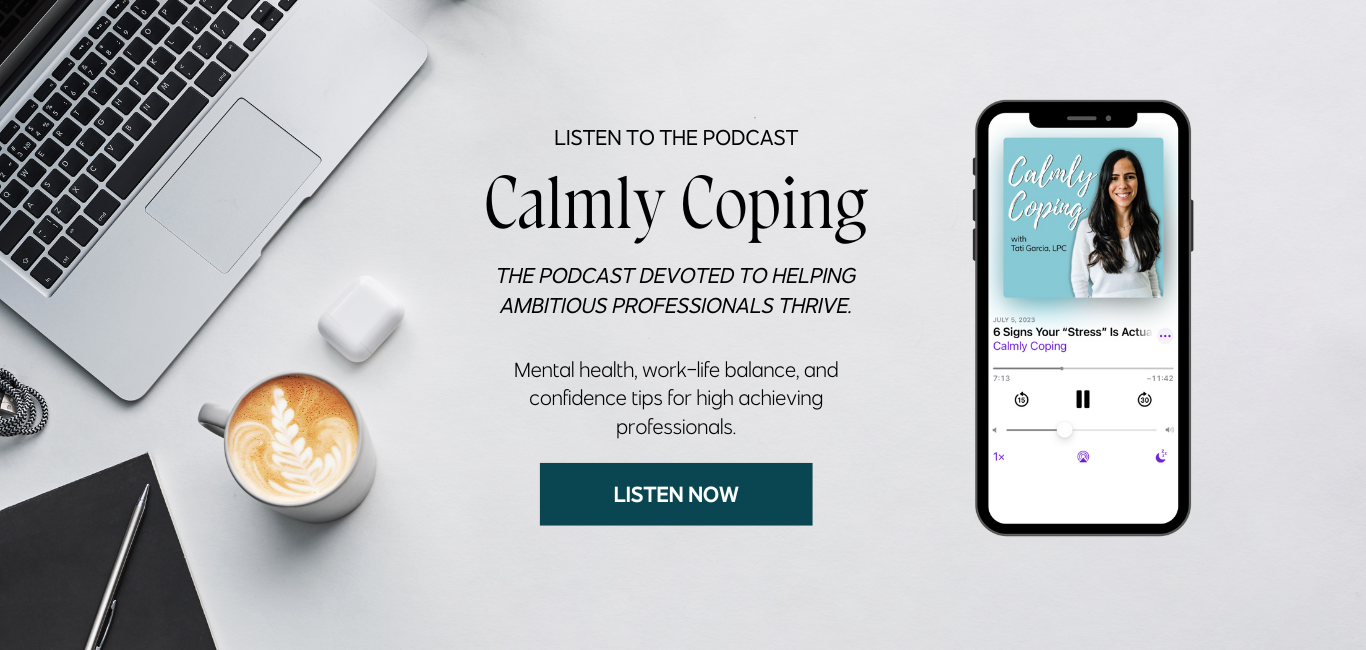
INTRO/OUTRO MUSIC: Rescue Me (Instrumental) by Aussens@iter (c) copyright 2018 Licensed under a Creative Commons Attribution (3.0) license. http://dig.ccmixter.org/files/tobias_weber/57990 Ft: Copperhead
DISCLAIMER: All content here is for informational purposes only. This content does not replace the professional judgment of your own mental health provider. Please consult a licensed mental health professional for all individual questions and issues.
Interested in diving deeper to get support for high-functioning anxiety?
I offer 1:1 coaching to help high-achievers overcoming high-functioning anxiety so they can feel calmer, more present, and have improved balance in their lives. Click here if you’re interested in learning more and getting started.
Calm, Balanced, & Confident is my comprehensive A→Z self-paced course to help high-achieving professionals overcome high-functioning anxiety so they can feel calmer, balanced, and more confident without the anxiety and overwhelm. Click here to learn more and enroll today.
Looking for ongoing support and guidance with high-functioning anxiety? The Calm & Ambitious Community is the exclusive community for high achievers with high-functioning anxiety. Click here to learn more and join us today!
TRANSCRIPT:
Click to view the episode transcript.
Performance anxiety. It’s the psychological and physical nervousness that occurs during and before a performance of any kind that can make it harder for you to do your best focus and feel confident in yourself. Performance anxiety affects up to 20 percent of Americans, including individuals who perform for a living and those who are in positions of leadership.
It is entirely possible to take steps to reduce your performance anxiety so you can perform and present yourself with more performance. Ease and inner confidence, and that’s what we’ll be discussing in today’s episode. Welcome to Calmly Coping. I’m your host Tati Garcia. I’m a licensed therapist and a high functioning anxiety coach.
Calmly coping is the podcast for people who struggle with anxiety and high functioning anxiety. Each Wednesday you’ll hear informative episodes with. actionable tips about decreasing anxiety, adopting a healthy mindset and managing your time and energy so you can live a calm and balanced life. Let’s get started.
Thank you so much for tuning in. So I have personal experience with performance anxiety. A few years ago, this was 2018 or 2019, I was requested to play a cocktail hour at a wedding to play piano. I prepared for this for months beforehand. I had an entire plan of what pieces I was going to be playing and I felt pretty confident in them.
I had practiced beforehand at other locations that were kind of like low stakes. And so, I felt comfortable going into it. However, the morning and day and like right before the performance, I had pretty severe performance anxiety. I was really irritable. My family was there as well. And so, you know, when my parents were trying to talk to me, I just told them like, I can’t even have a conversation.
Like I couldn’t focus on anything else. I couldn’t. think about anything else because I was feeling so anxious in anticipation of the performance. I was trembling and shaking and sweating. I had a rapid heart rate. I just had difficulty focusing and thinking clearly. I was getting annoyed easily. And I also had this big fear of making a mistake or humiliating myself, all of these feelings intensified right before the performance.
And then during I felt okay. And because I had practiced so much, I was able to do what I needed to do and perform well. However, you know, people were coming up cause they knew me and trying to like. talk to me or say like thumbs up or something, but I was so focused and so nervous about making a mistake or anything that I couldn’t even look away for a second.
Obviously when, when you’re performing, you’re not necessarily going to be having conversations with people, but I felt like in that moment, I was very anxious and very nervous about, you know, what could happen. And so it’s not to say that this was a bad experience. You know, I enjoyed it. I, afterwards, was very proud of myself for doing that.
However, I find that with certain situations that anxiety that performance anxiety can come up for me. And if this is something that you can relate to, then that’s what we’ll be talking about in this episode, how to overcome performance anxiety, how to not get in that state where your entire day or the days leading up to it, feel like they’re just encompassed by this anxiety, these physical symptoms, but also these psychological symptoms that are making it harder for you to just function through your days. And we’re going to talk about what the signs of performance anxiety are and then what you can do about it. So first, the definition of performance anxiety is extreme nervousness experienced before or during participation in an activity taking place in front of an audience.
So it can be extremely uncomfortable. So there are certain triggers for performance anxiety. So it could be any performance or presentation in front of a group of people, no matter how small. So it could be a group with many people or larger groups, and it could be any sort of context. It doesn’t even have to be a context that feels very important or like a kind of professional performance, but it could just be a small meeting at work, or it could be a small group where you are meeting new people, or it could be in a classroom environment.
So it could be any sort of environment where you’re not even necessarily presenting, but it could just be even speaking casually in front of a group of people. These types of situations can sometimes trigger performance anxiety. It can occur in actors, musicians, athletes, leaders, public speakers, or anybody who is performing or presenting in front of people.
So here are some signs and symptoms of performance anxiety. I mentioned some in my personal example, but there can be other signs that might show up for you. So physical could be that soaring heart rate, dry mouth, and other physical symptoms such as numbness, trembling hands and voice. So sometimes it can be that your voice is actually shaking because you’re so nervous.
You could be sweating. You could feel sick. You could feel nauseous. You could have a tight throat, redness, or warmth in your face. Like, some people will blush because they get so nervous. There could also be digestive symptoms that occur. And so, with emotional symptoms of performance anxiety, it could be irritability, feeling anxious, fearful, annoyed, frustrated, nervous, or regretful.
Like, oh, why did I decide to do this? And then the cognitive symptoms could be persistent negative thoughts and worrisome thoughts, thinking about the worst case scenario, self doubt and fearing judgment and embarrassment from others, humiliation, anticipatory anxiety. So in the moments leading up to this event, then you’re gonna be maybe thinking about and anticipating and feeling anxious about that, playing out what will happen in your mind over and over again.
So some examples of actual prominent figures who struggle with performance anxiety or her struggle with it in the past are Barbara Streisand. So she developed overwhelming performance anxiety at the height of her career. And for 27 years, she actually refused to perform for the general public because of her performance anxiety.
Carly Simon was also another performer who abandoned the stage for seven years after she collapsed from nerves at a concert. And the singer Donnie Osmond also had panic attacks during performances for a number of years. So it is not just people. Who aren’t well versed in performance, it can happen to anybody, and it could be something that maybe you didn’t struggle with in the past, but then starts coming up out of seemingly nowhere, or maybe it could be related to something specific.
So whether you are a person who is just starting to perform, or you’re a person who has to perform or give presentations for your career, or it’s. Something that you have been doing forever and now you’re starting to experience this performance anxiety out of nowhere There are things you can do to combat that.
So here are my actionable tips to help you to do that So number one is to identify what you are afraid of So what is the worst that could happen and that you are fearing and how could you cope with it? You know a mistake that a lot of people make when it comes to dealing with performance anxiety Is that they often assume the worst?
In the situation, so they think that, oh, I’m going to do terribly. Everybody’s going to laugh at me. I’m never going to be able to perform again. I’m going to be seen as a laughingstock, whatever those worst case scenario fears could be. Oftentimes when you’re in a place of performance anxiety, you assume that that worst case is likely and will happen.
And sometimes just identifying and writing down, okay, what am I afraid of? of can help you to bring that to the light to help you to see that even if the worst happens, your life isn’t over, you’ll be able to manage and cope with it and overcome that. So name your fears. So I’m afraid I will embarrass myself.
People will know I’m unqualified, I will fail, et cetera. And the important thing to remember when identifying these fears is that you can manage whatever comes your way. Oftentimes with anxiety, it can feel like these fears are insurmountable. They’re so huge. We’ll never be able to overcome them. And that is not the reality.
When it comes to fears like performance anxiety, you can absolutely face this and overcome this. And it is something that you can learn and build upon as a skill. It’s not something that is necessarily innate. You know, there are people who maybe are more outgoing, who enjoy performing and it does not bring up anxiety for them.
However, that does not mean that you cannot learn to do well in a performance and to feel comfortable in a performance. Like anything, it is something that you can become more comfortable with and build that skill over time. So tip number two is to challenge negative thoughts that come up when it comes to your performance.
So think of what you would say to a friend who were thinking the way that you’re currently thinking. How can you challenge those thoughts in a positive or even neutral way? So for example, if you’re having the thought, I will embarrass myself, you’d be asking yourself, how do you know that this will happen?
You won’t have the opportunity to succeed if you don’t try. And you might actually even do even better than you expect. Many times we’re so hyper focused on the worst that we don’t even think of the possibility of things going well and the opportunities that could occur as a result or the potential outcomes of that.
The more you try, the more practice you have, and the more you will teach yourself that you are capable. And you can do this. Even if it feels uncomfortable. So practice challenging those specific thoughts that are coming up for you, the self doubt that comes up. One technique that I like to do that I share often is dividing a paper into two columns, writing down the negative thought in one column, and then challenging that thought in the other column.
And just working your way down, just doing a brain dump of, okay, what are all of the negative thoughts that are coming up for me about performing, and how can I challenge them? So tip number three is to prepare, prepare. prepare. This is just the fact that the more you prepare for your performance, the more comfortable and automatic you will feel doing it.
And so the less of a likelihood that those anxious thoughts can take over and say, I didn’t prepare enough. Now, one mistake that many people can make with performance anxiety is over preparing. And so what I mean by that is. So when you’re not actively preparing, maybe you’re sitting down on the couch relaxing, and you’re still thinking about this performance and trying to plan and like mentally think out what’s going to happen, doing things like that is not helping you to prepare and oftentimes just makes you feel more anxious.
And so devote your specific time to preparing. So whether that is. practicing, rehearsing, whether that is practicing or rehearsing in front of other people, be intentional with that time. But outside of the time that you are actually actively preparing, you don’t need to overthink things. And I know that stopping overthinking is easier said than done.
However, it is something that is entirely possible. So if you’re struggling with overthinking things, I actually have an entire mini course on how to stop overthinking. If you’re interested in enrolling in this and learning the step by step process to stop overthinking, you can go to calmlycoping.com/stopoverthinking.
So my next step is to have a pre performance routine to get you in the mindset. So get you in a calm and positive mindset before your performance or presentation. So some examples could be deep breathing. So this is something that I’m sure you’ve heard a million times before, but that’s actually because it’s very powerful and it helps to activate your body’s rest and relaxation response.
This is the parasympathetic nervous system. And this actually teaches your mind and your body to relax, to calm down, to get out of an anxious state. So setting a timer for five minutes and just taking some slow, deep breaths all the way into your belly, making the exhale a little longer than the inhale can really be powerful in helping to calm your mind and body.
Another thing that can help are things such as progressive muscle relaxation, meditation. physical activity to get out anxious energy, doing things like jumping jacks or going for a run or walk. And another thing that I like to suggest for clients is using positive coping statements or affirmations before a presentation.
So this could be taking the negative thoughts you identified and creating positive statements or affirmations to challenge these negative thoughts and then putting them down on an index card or in your phone or somewhere where you can repeat them as a way of priming your mindset to think in that way.
So this can help to reassure yourself prior to the presentation or performance. So some examples are, I know I am capable of doing this. I am confident in myself and in my abilities. I am an amazing and talented. blank. I know I have what it takes to do this. And I can do an entire episode with positive affirmations for performance anxiety.
So if this topic interests you, then let me know in the comments or send me an email at [email protected] and let me know. And another thing that can be helpful to as like a pre performance routine. is music. So I love if I know that I have something important, like whether it is a podcast interview and somebody else’s podcast or an important presentation, like a training live training that I’m doing, I will put my favorite music that I know will get me really happy and in the mood.
So you can put whatever music works for you can put calming music, you can put music that makes you feel happy. You can put anything that is going to put you in the mindset that you want to be in. Recently for me I have been obsessed with the song Rosalinda’s Eyes by Billy Joel and so that would probably be my current song for pumping myself up prior to a performance or presentation.
And my next tip is to let go of the need to be perfect. So one mistake that many people make when it comes to performance anxiety is putting tons of pressure on themselves and feeling like they’re not allowed to make. any mistakes. And here’s the thing, no human being is perfect and that’s okay. You’re going to make mistakes.
Everybody does. Oftentimes when we’re doing a performance, most people won’t even notice our mistakes and we’re more hyper fixated on the mistakes that we make ourselves than other people are. And you know, it is our imperfections that make us authentic. relatable and unique. So nobody expects perfection from you.
And ironically, the more you let go of that pressure and that expectation for yourself, the more you let go of that pressure and that expectation for perfection, the more at ease and confident you will feel. It’s kind of like Letting that weight fall off of your shoulders. And it’s not that you are completely dropping the ball and not wanting to do well.
It’s that you are not expecting what is unattainable and unrealistic. So try out these tips in your own life. And I’d love to hear how it goes for you. You can leave me a comment if you’re watching on YouTube or if you are listening on Spotify. And let me know what is your biggest struggle with performance anxiety.
If you’re looking for personalized support. on overcoming performance anxiety, you can learn more about how to work with me by clicking on the link in the description. And while you wait for the next episode, I have an episode that I think will be perfect for you, which is how to deal with imposter syndrome.
You can check out that episode by clicking here or clicking on the link in the description. I also have other episodes about how to calm your mind, how to create work life balance and how to feel more confident from within. Thank you so much for tuning in today and until next time, be calm. Thanks so much for listening.
If you like what you heard, please share this episode with a friend, and please subscribe and leave me a review on iTunes. Also, remember to check me out online at calmlycoping.com and connect with me on Instagram @TatianaGLPC. All content here is for informational purposes only. This content does not replace the professional judgment of your own mental health provider.
Please consult a licensed mental health professional for all individual questions and issues. Till next time, I’m Tati, and this has been Calmly Coping.
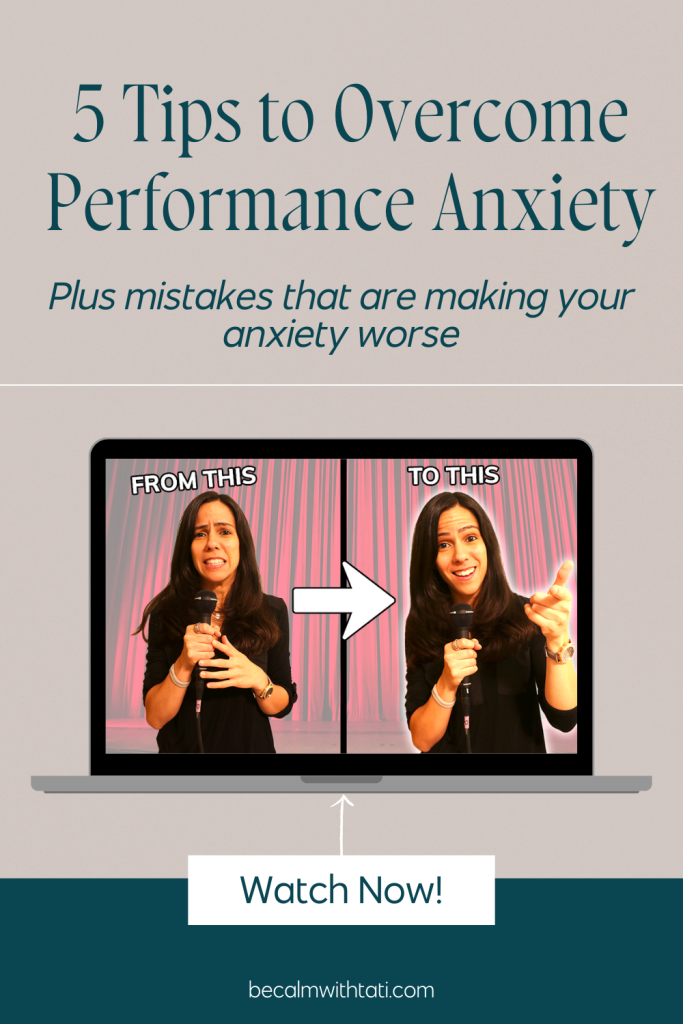
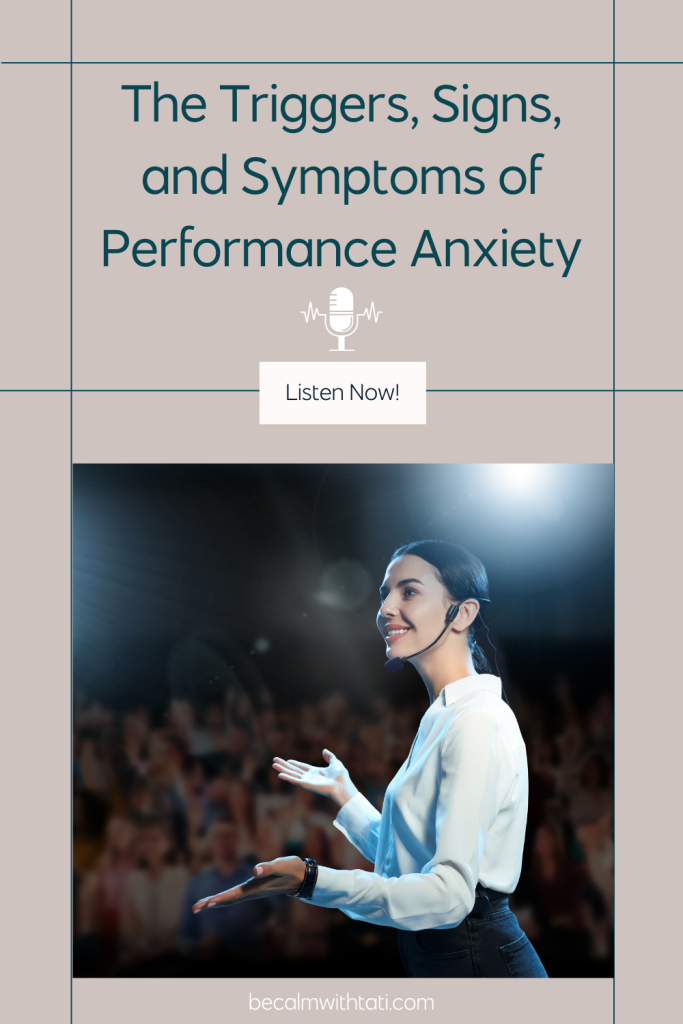
Until next time…




